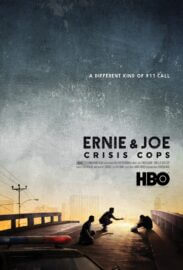Enjoy a free preview via Film Discovery! Click here !
Enjoy a free preview via Film Discovery! Click here !
Enjoy a free preview via Film Discovery! Click here !
Enjoy a free preview via Film Discovery! Click here !

https://www.filmplatform.net/product/ernie-joe-crisis-cops
ERNIE & JOE: CRISIS COPS follows two police officers with the San Antonio Texas Police Department who are diverting people away from jail and into mental health treatment, one 911 call at a time.

I believe strongly that my own contribution can be in raising awareness of tough societal issues through relatable characters and their stories. While making my last film, MOTHERS OF BEDFORD, it became evident to me that there were many people with untreated mental illness sitting behind bars. Upon learning of the innovative work of the SAPD mental health unit and meeting Ernie and Joe in person I felt compelled to make this film. Their jail diversion work is humane and desperately needed to improve not only the health of the mentally ill, but also of their families. We have seen many films illustrating the multitude of sins in police departments across the country. ERNIE & JOE introduces us to officers trying and succeeding in doing it right. – Jenifer McShane
1. How did this film come about? How did the idea originate? What inspired you?
While making my last documentary, Mothers of Bedford, which takes place in a maximum security prison, it became very clear to me that many untreated or poorly treated people suffering with mental health issues are sitting behind bars. When the work happening in San Antonio came to my attention and once I spent time with Ernie and Joe (initially without a camera) I immediately felt compelled to return to San Antonio and tell this story.
2. How long did it take to make the film? From concept to finish.
About 3 years which compared to my last film is quick! The access was very good which meant I could return regularly which was important to me. It is such a timely issue I did not want to sit on the film any longer than necessary.
3. Why did you make this film?
I thought Ernie and Joe were great characters to help open people’s minds and hearts to the heartache so many in mental health crisis are experiencing and how vital it is that the initial encounter between the first responder and a person in crisis is handled with de-escalation in mind. So many tragedies could be avoided. I strongly believe training law enforcement to recognize mental illness and to listen and communicate more effectively has tremendous impact on all interactions police have with the public, not just those in a mental health crisis. The mental health officers all told me that they heard regularly from the spouses of officers that the training had a positive role on their home lives.
4. Share a story about filming.
I have to say I found San Antonio very open and very friendly. Less suspicious than some other cities I have filmed in. The other wonderful surprise was how much humor there is in the film. Ernie and Joe are naturally funny together and I loved injecting moments with unexpected humor that comes from the natural banter of two people who spend countless hours side by side.
5. Did the film change from your original idea for the film as you were filming or in post?
I was a little heartbroken at how much we had to cut. During the edit my editor and I had to distill everything down to what scenes were moving the story forward while also providing as authentic a big picture view as possible. Initially, I wanted to include more of the perspective of civic stakeholders in San Antonio because it is a very important piece of the equation. The work being done by SAPD is successful BECAUSE it is done in conjunction with the local mental health community. Of course, it is not a perfect system but they are attempting collaboration between various agencies, hospitals and organizations in a meaningful way which I found very impressive. Collaboration is the secret sauce in any success being achieved.
6. What were the challenges in making this film?
I wanted the experience to feel immersive but not exploitive. These people in crisis are suffering and often at the lowest point in their lives so I tread carefully. I did not want my presence to change or influence in any way the interaction they were having with Ernie and Joe. I tried to be as observational as I could. Initially, I had hoped to follow the people in crisis through treatment but with HIPPA and other privacy concerns I decided against that approach.
Another challenge was that so much of the story takes place in the car. I was worried that it might feel claustrophobic for the audience but it actually gave us a chance to see and feel how much time officers spend together and the connection that can develop. I tried to convey that Ernie and Joe are part of a 10-person unit but since they are spread across the city in pairs that was a major challenge.
A humorous challenge was my inability to cope with the heat. My husband once referred to me as “heat intolerant”. I really am. I always seemed to be filming when it was over 100 degrees. Once the temp goes over 100 my internal thermostat crashes.
7. What were the successes that you had in making this film?
Honestly, I feel blessed to have found this story and these two subjects. They were very open and willing to let me follow. The access and their willingness to trust what I was doing was tremendous.
8. What do you want audiences to take away from this film?
The greatest legacy each person has is the impact they have on a fellow human being. We all can do it in small ways in our daily lives. The humanity we witness in the interactions between the mental health officers and the person in crisis is one important takeaway. I hope this film helps provide awareness of the extent of the mental health crisis in this country (1 in 5 Americans has a mental health diagnosis). As a civilized society we must not criminalize mental illness, we must learn how to treat not arrest it away. We can not expect law enforcement to be first responders to all manner of crisis if we are unwilling to provide them with effective training to understand the situation that stands before them and the support to recognize their own fears and mental health challenges.
9. Was there something special technically that you utilized in making this film – your cameras or sound or editing etc… and why were these important.
Good sound is always vital but it was particularly so because we were often shooting from a distance and sound was the only way to get the intimacy. Also, our cinematographer, E.J., is an excellent verité shooter. I was very fortunate to have an excellent Austin based crew. There were a few times when they could be there when I couldn’t be because they were only an hour away.
10. Where do you find inspiration or who/what has influenced you as a filmmaker?
So many, too many to elaborate. I will say I appreciate documentaries that preach less and show more.
11. Anything else you want to add about the making of the film and it’s importance?
So many documentaries I appreciate identify the problems of our times. That is vitally important but I think it is also important to include solution based stories. Ernie & Joe gives us food for thought and a little hope for making things better and, perhaps, even help mend the tattered relations between the public and police in so many communities.